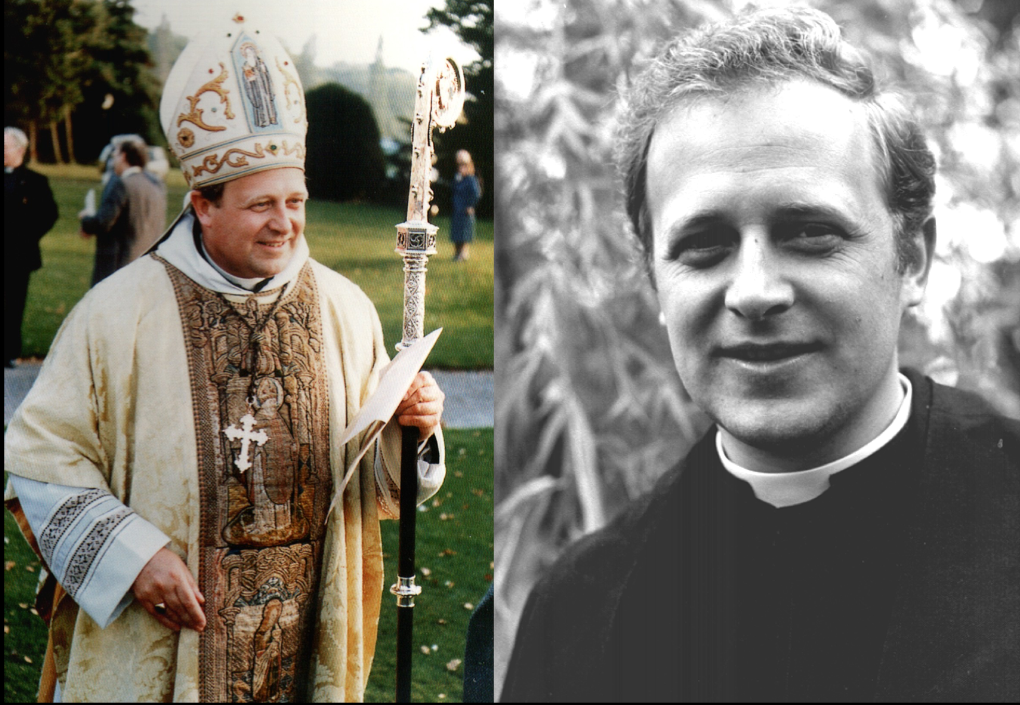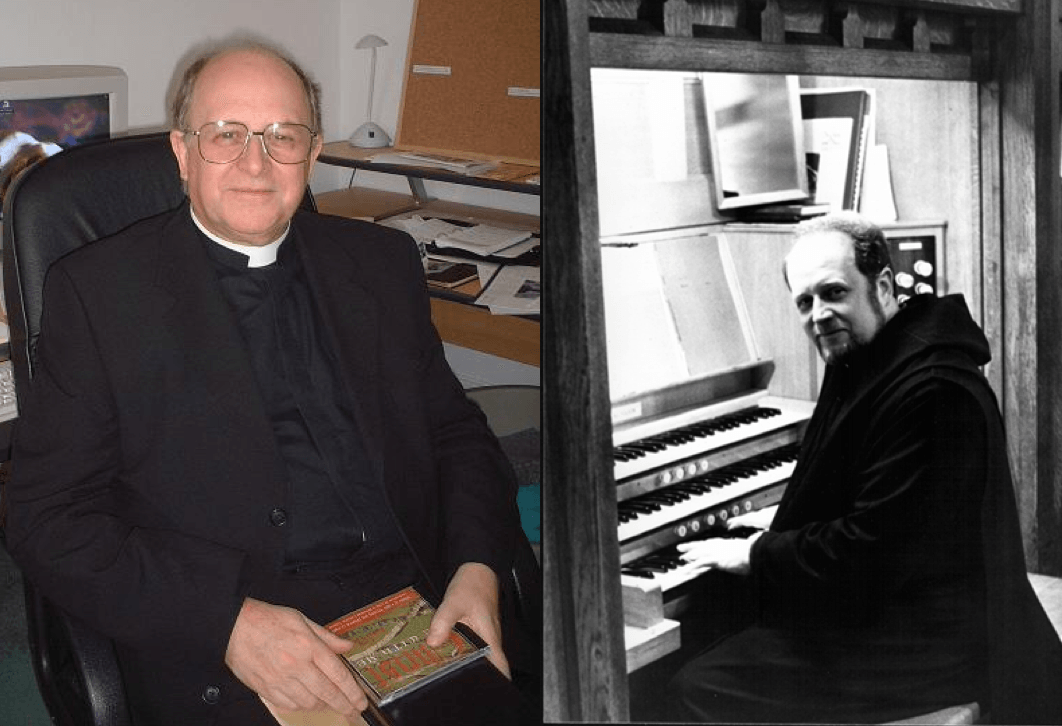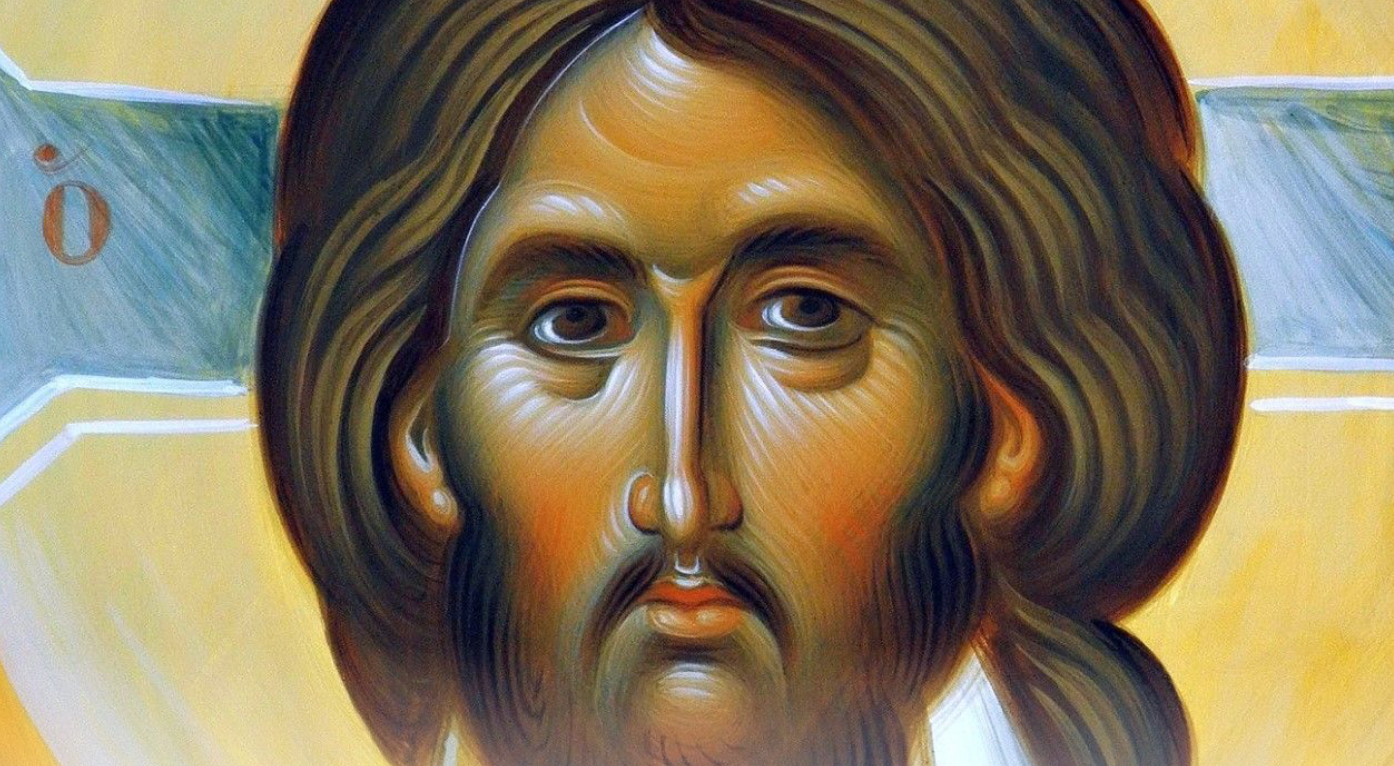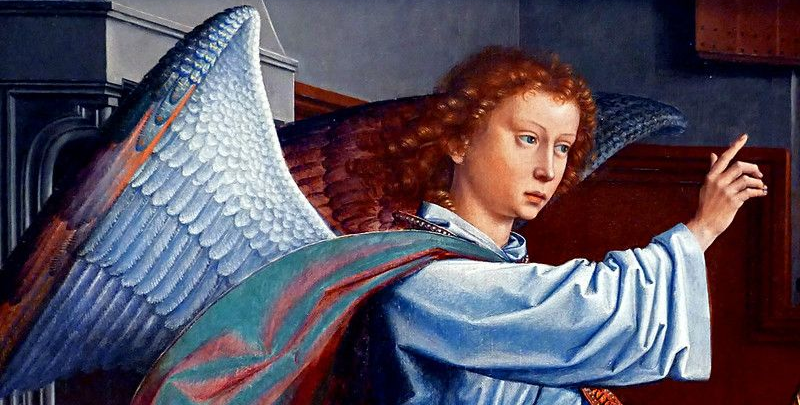Abbot Alan Rees
As a child Dom Alan soaked up the Welsh hymn-singing tradition, and became a renowned Church musician. His 'Papal Mass' was sung for the visit of Pope John Paul II. But he was so much more: a warm-hearted and gentle spiritual writer and guide who served as Abbot of Belmont for 7 years. He died on 2nd October 2005 after an unshakeable bout of depression.
Many years ago I was shown an icon of two women embracing. Before I realised they were women, I thought it might be the usual icon of St Peter and St Paul or St Peter and St Andrew. I asked the monk who they were, as the writing was in Slavonic or Rumanian. He said, “This is Our Lady, the Mother of Jesus, and that is the Mother of Judas. Both mothers lost their sons on Good Friday and both mothers were helpless as they stood by and watched their sons die. That day a sword pierced two hearts, not one. Our Lady is assuring Judas’ mother that Jesus died and rose again to save us all, even Judas.”
We all know of the immense suffering and mental anguish that led to Abbot Alan’s untimely death last week. He went through hell, convinced that God had abandoned him, that his life was worth nothing, that he no longer deserved to live. Nothing could convince him otherwise. Ultimately, he took the only way out a troubled mind could think of, and nothing and no-one could stop him. He, who had helped so many, could not help himself or accept the help of others, even of those who loved him most.
Today Our Lady, Comforter of the Afflicted, consoles us as she did the Mother of Judas, with the assurance of God’s mercy, God’s forgiveness and God’s love for Alan and for us, who mourn his dreadful passing from this world. We believe that Alan is now at peace, resting where he always wanted to be, safe in the arms of Jesus, in the presence of the angels and the saints. What blessed assurance that is! So it is with confidence in the loving-kindness of our heavenly Father that we celebrate this Requiem Mass, to thank God for the gift of Alan to the Church and to the world and to pray for his eternal rest. “Everything,” someone wrote to me this week, “everything, Alan’s suffering and our own, is caught up in the unspeakable mystery of the Cross.”
The readings we have just listened to were very close to Alan’s heart. They are the source of that profound spirituality he shared with so many. How often he repeated those words from the Book of Joshua, “Be strong and courageous, do not be frightened or dismayed, for the Lord your God is with you wherever you go.” The amazing thing is that a man, who could instil such faith, such hope, such confidence and such courage in others was often unable to apply the Word of God to himself and lay claim to its power.
For his Ordination card in 1974 he chose that text from Second Corinthians, “We have this treasure in earthen vessels (clay pots), to show that the transcendent power belongs to God and not to us.” He was painfully aware of this fundamental truth that we are all fragile, breakable and, indeed, worthless in ourselves. It is the treasure we hold that matters. We are precious, not for what we are in ourselves, but for what we contain, the indescribable gift each one of us carries: God’s grace, God’s beauty, God’s love, God’s very life.
In 1982 the SPCK published a book of personal testimonies, written by monks and nuns of the English Benedictine Congregation. It was called “A Touch of God”. I suggest you reread Alan’s contribution, truthful, telling and, with hindsight, frightening. The same is true of the many prayers he had published, mostly a cry for help from the very depths of distress. In reading what he wrote you will find the seeds of his tragic death and violent end. But that title is what Alan was for so many people, a touch of God. Thinking of everything that has been written or said about him this week brings to mind the conclusion of St John’s Gospel. “There are also many other things that Jesus did; if everyone of them were written down, I suppose that the world itself could not contain the books that could be written.”
Alan spent his life “proclaiming Jesus Christ as Lord.” And from his earliest years it was “the light of Christ that shone out” in every aspect of his life and personality. He was a handsome lad with blond hair and blue eyes, a sweet voice, a shy smile, and a gentle nature. He was goodness itself. And he was an intelligent youth, highly talented and with a great sense of humour. Like most men, though not women, he also had a streak of laziness. He would do so much and no more. His attraction to religion and to the religious life began, of all places, in the Pentecostal Mission Tent just down the road from home in Cwmrhydyceirw. He was just six when he set up his first altar in his bedroom and would spend hours praying and singing the praises of the Lord. With his father, Jack, he attended Tabernacle Welsh Baptist Chapel, Morriston, and with his mother, Hilda May, he went to St David’s, Church in Wales. In the 40s and 50s everyone in Wales went to Church or Chapel, three times on a Sunday and often during the week. Alan’s love for music was inexorably bound up with his love for religion and he learned to play the organ in chapel long before his feet could reach the pedals. His love of melody and his ear for a good tune began here. His natural feel for language was rooted in Welsh hymns and the Book of Common Prayer. He was influenced by William Williams Pantycelin and Anne Griffiths long before he was acquainted with the Church fathers and the English mystics. He was a Welshman through and through, Welsh speaking, and proud of his origins and his family.
One of those Welsh hymns he sang as a boy marked him for life and sums him up beautifully.
Gofyn wyf am galon hapus, (What I ask for is a joyful heart,
Calon onest, calon lân. A truthful heart, a holy heart.
Calon lân yn llawn daioni A pure heart full of goodness,
Tecach yw na’r lili dlos: More lovely than the lilies.
Dim ond calon lân all ganu – Only a pure and holy heart can sing,
Canu’r dydd a chanu’r nos. Sing by day and sing by night.)
He passed the eleven-plus and won a
scholarship to Dynefor School, Swansea. At about the same time he came to know
the legendary Father Gillingham at St Alban’s, Treboath, and became an Anglo-catholic.
In his first year at University College, Cardiff, he was received into the
Catholic Church by Dom Leo Cesar, the saintly Ampleforth monk. It was here in
Cardiff, too, that he suffered his first nervous breakdown. The rest of his
life is well-known to you: teacher, cathedral organist and choirmaster,
Benedictine monk, student in Rome, priest, charismatic, housemaster in the
school, novice master, and in 1986 elected abbot.
As he himself wrote, perhaps he should not have become a monk. He was too delicate, physically and emotionally, for the rough and tumble of life in a Benedictine monastery. Throughout his thirty seven years as a monk, he had a love/hate relationship both with monastic life as an ideal and way of life and with Belmont as a specific monastic community. He often repeated the immortal words of old Br Joseph, “Oh, why did I leave home?” When he was abbot he dreaded returning to Belmont after a journey and sometimes got as far as the Ruckhall road and turned back. Perhaps he should not have been elected abbot, for in the depths of depression he had to resign in 1993. Much of his recent illness had to do with those seven years as abbot. It was impossible to convince him that he had been a good abbot, a loving and patient father for the community and a shining example of personal holiness and of genuine monastic observance. His dislike of being in authority stemmed, on the one hand, from his acute sense of responsibility and duty and, on the other, from his fear of confrontation.
He loved being the Titular Abbot of Tewkesbury and enjoyed his work as Vicar for Religious in the Archdiocese of Cardiff. His influence and good work, as you all know, spread far beyond the confines of his own monastic community. He was sought after as a retreat giver, confessor and spiritual director. Everyone found in him a warm heart, a treasury of divine wisdom and common sense, a shoulder to cry on, an intercessor and a true friend. And he got on with everyone.
Then there were his musical skills. Someone said jokingly, “He probably composed more Masses than Palestrina.” He certainly wrote most of the music we sing at Belmont and he composed settings of the Mass and Office for many religious communities, parishes and schools. In his humble, self-effacing way, he considered these of little worth compared to the Graduale and Antiphonale of the Gregorian tradition. For many years he was deeply involved with the Society of St Gregory, the Panel of Monastic Musicians and the International Committee for English in the Liturgy. ICEL’s tribute seems to sum up his contribution to every group he touched. “Alan brought to the discussion of ICEL’s work a genuine and profound artistic sense and intuition. A very gifted and well trained musician, he possessed great simplicity and a truly humble and gentle spirit. The music he composed captured his spirit so well – simple, tasteful, singable and, above all, very prayerful. May Alan’s spirit and music continue to sustain you in your work and in your prayer.” Yes, he was a clay jar and very conscious of it too, but what treasure it contained and for how many!
In the Gospel we heard the well-known account of Jesus’ visit, probably one of many, to Martha and Mary: Martha busy, worried and distracted, Mary peacefully, lovingly silent at the feet of Jesus. There is a bit of Martha and of Mary in all of us, and there was in Alan. So far we have concentrated on Martha: the writing, composing, organ playing, teaching, joking (he was the life and soul of the party and a brilliant mimic), eating (he loved a good meal, preceded by a couple of gins or a Campari), shopping (he was an inveterate shopper and bargain hunter – in particular he could not resist a stationary shop) and collecting (he was a great accumulator, he threw nothing away). But there was the other side too. Like Mary he was a listener and a contemplative. He would willingly spend hours in the confessional, in the convent parlour or in someone’s home. He could also spend hours, as few of us can, in silence, at his lectio or at prayer. At the heart of it all was a man of prayer who loved his heavenly Father, who lived for Jesus Christ and was truly filled with the Holy Spirit.
“Mary has chosen the better part, which will not be taken away from her.” The anguish of those endless months of depression was due, above all, to the feeling that he had lost the better part, that God had punished him for his sins by taking it away from him. There is no deeper suffering than to sense that one has lost ones faith. It is the dark night of the soul. Someone said to me this week, “Alan died months ago.” Sadly that was true. “Death is at work in us, but life in you,” wrote St Paul. He was crushed, driven to despair, perplexed, persecuted and struck down. On the feast of Padre Pio, just a week before that fateful day, in one of those endless conversations we had, I told him that his mental sufferings were his stigmata, that he was truly crucified with Christ. As it turned out, oh unhappy irony, the pathologist’s report showed that he had cancer of the kidney. He would probably not have lived very long.
Today we praise and thank God for the gift of Alan and for Alan’s life, all of it, the good and the bad, the joyful and the sad, the holiness and the sinfulness, that richly interwoven texture of the human and the divine that meant so much to so many and to God himself. Alan lived and died for his Lord and Saviour Jesus Christ in the power of the Holy Spirit and to the glory of God the Father. May he now rest in peace. Amen.











